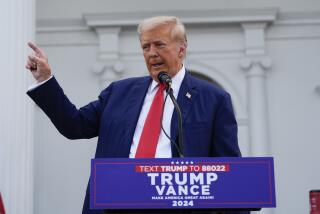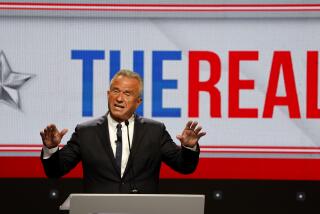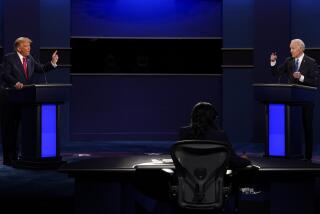Kerry Firing Away at Bush’s Reputation as Straight Shooter
After months of attacking President Bush’s policies, Sen. John F. Kerry is stepping up an assault on his rival’s character, challenging Bush’s credibility on everything from job creation to the war in Iraq.
Stopping just short of calling the president a liar, Kerry routinely accuses Bush of “running up a truth deficit” and compiling “a long list of broken promises.”
“The American people have a right to the truth,” Kerry said Wednesday, in a characteristic jab at a town hall meeting in New York City. Afterward, he questioned Bush’s candor during Tuesday’s prime-time news conference, which was dominated by discussion of Iraq.
“The American people are owed a directness and an honesty about how we protect our troops and how we stand up for our interests,” Kerry told reporters.
His strategy is risky. By challenging Bush’s truthfulness, the presumptive Democratic nominee invites scrutiny of his reputation for vacillation and seemingly contradictory stands, such as backing the president’s decision on whether to go to war with Iraq but against continued funding for military operations and the country’s reconstruction.
“They’re swimming way upstream on this one,” said Matthew Dowd, a top strategist for the president’s reelection effort.
But the reward for Kerry also is potentially significant, as the Massachusetts senator aims at one of Bush’s biggest political strengths: his image as a leader who talks straight and is resolute in his positions.
“It doesn’t merely take on the president on one issue, or one subject or one decision,” said Stuart Rothenberg, a nonpartisan elections analyst. “If successful, it undercuts him across the board.”
That, of course, is a big if. With the country so deeply polarized, Kerry’s attacks may only reinforce what people already believe. As Rothenberg put it: “Republicans think anything the Democrats say is pretty much a lie. Democrats already believe anything Bush says is a lie.”
Still, there are worrisome signs for the president.
Recent opinion polls showed not just a decline in Bush’s job approval and performance ratings, but also growing doubts about his veracity and character. A Los Angeles Times survey conducted in late March, found that 47% of the 1,616 people interviewed believed Bush had the honesty and integrity to be president, down from 56% who described Bush as honest and trustworthy in a survey in November.
Among independents -- the swing voters likely to tip a close election -- the percentage of respondents who described Bush as honest fell from 54% in November to 43% in the most recent Times Poll.
In that time Bush has faced credibility questions on numerous fronts.
Paul H. O’Neill, his former Treasury secretary, and Richard Clarke, the administration’s former counter-terrorism chief, each offered insider accounts in newly published books and made the rounds of TV news shows presenting less-than-flattering portraits of the president.
And the White House has been thrown on the defensive by the Sept. 11 commission investigating the government’s actions before the terrorist attacks.
But much of the erosion appears rooted in growing public doubts about the war in Iraq and, as some see it, the disconnect between the results Bush promised and the way events have played out.
“There are no weapons of mass destruction. After the capture of Saddam it got worse, not better,” said one Republican campaign strategist, who has been close to the White House and did not want to be identified as a critic of Bush’s policies.
“All of the markers they set have been bogus as far as what the reality turned out to be.”
Dowd said Bush had never minimized the difficulties facing the U.S. in Iraq and said there was a difference between “being dedicated to what you think is the right policy and being Pollyannaish.”
“Part of what the public expects is that you stay true to your core principles and follow through on what you said,” Dowd said.
In that way, supporters of the president believe events in Iraq will ultimately bolster Bush’s case for reelection. The Republican strategist who criticized the president’s handling of Iraq also asserted that Kerry was “all over the map” on the issue.
“It’s one thing to accuse Bush of playing fast and loose and another to be seen as a viable alternative,” the strategist said. “It’s two steps, not just one.”
Bush suggested as much Tuesday night. Deflecting several pointed questions about his handling of Iraq, Bush welcomed the contrast with Kerry and even addressed the credibility question, telling reporters: “One thing is certain ... about me, and the world has learned this. When I say something, I mean it.”
But Kerry and his allies have expanded their assault on Bush’s trustworthiness to go well beyond the war in Iraq, making it a part of a daily drumbeat.
When the Labor Department released new employment figures earlier this month, Kerry and fellow Democrats downplayed the good news -- the addition of more than 300,000 jobs in March -- and focused on the net job loss during the nearly 3 1/2 years Bush has been in office.
“This is a credibility issue,” Leo Gerard, president of the United Steel Workers of America, insisted in a conference call arranged by the Kerry campaign.
On the stump Kerry regularly challenges Bush’s truthfulness, describing the president and his team as “the biggest say-one-thing-do-another administration in the history of the country.”
He accuses Bush of breaking “almost every promise” he made in the 2000 campaign by rolling back protections after campaigning as a friend of the environment, stinting on education funding after setting new standards for schools, creating record budget deficits and using Social Security funds to pay for other programs after stumping as a fiscal conservative.
Even Kerry’s parenthetical asides -- “here, again, the administration will not face the truth” and “they are running ads, no surprise, that don’t tell the American people the truth” -- aim to undermine Bush’s forthright image.
Michael Meehan, a senior Democratic campaign strategist, described the tactic as “Kerry turning the boat and putting in on the beach,” a reference to the senator’s Vietnam service, when he directed his swift boat into enemy fire and dashed ashore to kill a sniper.
“It’s going directly at what is perceived to be [Bush’s] greatest strength,” Meehan said.
The strategy aided Kerry in the Democratic primaries, when he helped derail Howard Dean by arguing that the former Vermont governor’s candor was more reckless than refreshing.
But going after Bush, who starts with a much more positive image, would appear to be tougher.
Bruce Buchanan, a government professor at the University of Texas, said Americans had an innate skepticism toward politicians and their promises. If an elected leader dissembles about something voters find inconsequential, they will likely shrug if off, Buchanan said.
“But if you seem to be misrepresenting something they do care about ... it hurts,” Buchanan said.
Whether Kerry can turn Bush’s character and credibility from an asset to a liability depends on many things apart from the president’s performance, analysts said. Not least is whether the Democratic hopeful -- who is still introducing himself to voters -- comes to be seen as honest and trustworthy himself.
At this point, “it’s no sure thing for either candidate,” Buchanan said.
Times staff writers Matea Gold and Maria L. La Ganga contributed to this report.
More to Read
Get the L.A. Times Politics newsletter
Deeply reported insights into legislation, politics and policy from Sacramento, Washington and beyond. In your inbox three times per week.
You may occasionally receive promotional content from the Los Angeles Times.











